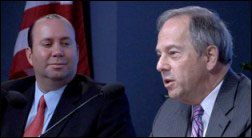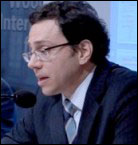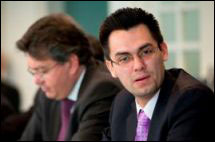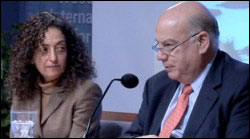The Americas and the World: A New Study on Public Opinion in Latin America on Foreign Affairs Coordinated by CIDE
Cynthia J. Arnson, Woodrow Wilson Center; Guadalupe González, Centro de Investigación y Docencia Económicas (CIDE); Jorge Schiavon, CIDE; Robert Pastor, American University; Francisco Gonzalez, Johns Hopkins University-SAIS; Armand Peschard-Sverdrup, Peschard-Sverdrup and Associates, CSIS; José Miguel Insulza, Organization of American States; Ferrán Martínez I Coma, CIDE; Miguel Angel López, Universidad de Chile; Mauricio Cárdenas, Brookings Institution; Peter Hakim, Inter-American Dialogue; Andrew Selee, Woodrow Wilson Center
Overview

 Scholars analyzed the results of a new public opinion study which surveyed citizens from Mexico, Chile, Colombia and Peru on foreign policy, security, the economy and other topics. The research project, which has been carried out on a biannual basis since 2004 by the Centro de Investigación y Docencia Económicas (CIDE), is unique in that it not only presents public opinion on international affairs with many different cross-sections for statistical analysis, but it also surveys the opinions of major political leaders.
Scholars analyzed the results of a new public opinion study which surveyed citizens from Mexico, Chile, Colombia and Peru on foreign policy, security, the economy and other topics. The research project, which has been carried out on a biannual basis since 2004 by the Centro de Investigación y Docencia Económicas (CIDE), is unique in that it not only presents public opinion on international affairs with many different cross-sections for statistical analysis, but it also surveys the opinions of major political leaders.
Cynthia Arnson, director of the Latin America Program at the Woodrow Wilson Center, highlighted the importance of the CIDE survey for measuring public opinion on foreign policy. Guadalupe González, one of the three CIDE researchers who conducted the study, gave a brief overview of the study's parameters. She mentioned that although the study originally focused on Mexico, the survey was expanded in 2008 to include Colombia, Chile and Peru and will add Guatemala, Brazil, Argentina and Venezuela in 2010.
 Fellow CIDE researcher Jorge Schiavon observed that Mexicans surveyed seemed to have less interest in world affairs and were more introspective than in previous years. He highlighted that there are many Mexicos in terms of opinions on foreign policy; there were notable gaps in perceptions between the public and leaders and between the North and the South, as well as among those of varying age, education and leadership experience. American University scholar Robert Pastor highlighted that economic integration in North America has trailed off since 2001 because of increased competition from China, but he was skeptical that the survey results from Mexico indicate declining support for integration within North America. Francisco González, professor at the Johns Hopkins University School of Advanced International Studies, commented on the prospect of nationalism arising in an environment of deteriorating economic conditions. Armand Peschard-Sverdrup of Peschard-Sverdrup and Associates mentioned that the survey results indicate that Mexicans more strongly identify, at least culturally, with Latin America than with North America, despite economic integration with the United States and ties through migration and remittances.
Fellow CIDE researcher Jorge Schiavon observed that Mexicans surveyed seemed to have less interest in world affairs and were more introspective than in previous years. He highlighted that there are many Mexicos in terms of opinions on foreign policy; there were notable gaps in perceptions between the public and leaders and between the North and the South, as well as among those of varying age, education and leadership experience. American University scholar Robert Pastor highlighted that economic integration in North America has trailed off since 2001 because of increased competition from China, but he was skeptical that the survey results from Mexico indicate declining support for integration within North America. Francisco González, professor at the Johns Hopkins University School of Advanced International Studies, commented on the prospect of nationalism arising in an environment of deteriorating economic conditions. Armand Peschard-Sverdrup of Peschard-Sverdrup and Associates mentioned that the survey results indicate that Mexicans more strongly identify, at least culturally, with Latin America than with North America, despite economic integration with the United States and ties through migration and remittances.
 Secretary General of the Organization of American States José Miguel Insulza discussed the ways in which foreign policy develops partly as a consequence of local politics. He highlighted growing concern among Latin Americans about the chronic domestic problems of poverty and crime and how this feeds into a lack of trust and a negative vision of the world. With respect to Latin Americans' opinions of the United States, Insulza noted that the region has a natural tendency to focus, for better or for worse, on that country responsible for three quarters of the hemisphere's GDP. He also mentioned the prospect for deeper collaboration with the Obama Administration on determining priorities and objectives. Insulza said that it is unlikely that there will be many contentious demands made at the upcoming Summit of the Americas,
Secretary General of the Organization of American States José Miguel Insulza discussed the ways in which foreign policy develops partly as a consequence of local politics. He highlighted growing concern among Latin Americans about the chronic domestic problems of poverty and crime and how this feeds into a lack of trust and a negative vision of the world. With respect to Latin Americans' opinions of the United States, Insulza noted that the region has a natural tendency to focus, for better or for worse, on that country responsible for three quarters of the hemisphere's GDP. He also mentioned the prospect for deeper collaboration with the Obama Administration on determining priorities and objectives. Insulza said that it is unlikely that there will be many contentious demands made at the upcoming Summit of the Americas,
 Commenting on the study's findings for the rest of Latin America, CIDE researcher Ferrán Martínez i Coma said that the survey suggests that the United States is an "admired" but "distrusted" partner for Latin America and that Venezuela under Hugo Chávez is viewed as very influential but conflictive. Miguel Ángel López of the Universidad de Chile summarized that while the results show some openness and interest in the world, there was more optimism for Latin America than for the rest of the world. Mauricio Cárdenas, director of the Latin America Initiative at the Brookings Institution, highlighted several important discoveries in the study, including that there was support for free trade, but not for globalization, which may indicate that the term is not understood as solely an economic term, but perhaps as a challenge to local culture. He added that of the four countries surveyed, Colombians were most supportive of governmental policies and that, whereas drug trafficking emerged as a top foreign policy priority for Mexicans and Colombians, border conflicts were more relevant for Peruvians and Chileans. President of the Inter-American Dialogue, Peter Hakim, moderated the panel.
Commenting on the study's findings for the rest of Latin America, CIDE researcher Ferrán Martínez i Coma said that the survey suggests that the United States is an "admired" but "distrusted" partner for Latin America and that Venezuela under Hugo Chávez is viewed as very influential but conflictive. Miguel Ángel López of the Universidad de Chile summarized that while the results show some openness and interest in the world, there was more optimism for Latin America than for the rest of the world. Mauricio Cárdenas, director of the Latin America Initiative at the Brookings Institution, highlighted several important discoveries in the study, including that there was support for free trade, but not for globalization, which may indicate that the term is not understood as solely an economic term, but perhaps as a challenge to local culture. He added that of the four countries surveyed, Colombians were most supportive of governmental policies and that, whereas drug trafficking emerged as a top foreign policy priority for Mexicans and Colombians, border conflicts were more relevant for Peruvians and Chileans. President of the Inter-American Dialogue, Peter Hakim, moderated the panel.
Andrew Selee, Director of the Mexico Institute at the Wilson Center, offered closing remarks.
Documents & Downloads
- The Americas and the World: A New Study on Public Opinion in Latin America on Foreign Affairs Coordinated by CIDEDownload
- The Americas and the World: A New Study on Public Opinion in Latin America on Foreign Affairs Coordinated by CIDEDownload
- The Americas and the World: A New Study on Public Opinion in Latin America on Foreign Affairs Coordinated by CIDEDownload
- The Americas and the World: A New Study on Public Opinion in Latin America on Foreign Affairs Coordinated by CIDEDownload
- The Americas and the World: A New Study on Public Opinion in Latin America on Foreign Affairs Coordinated by CIDEDownload
Hosted By

Mexico Institute
The Mexico Institute seeks to improve understanding, communication, and cooperation between Mexico and the United States by promoting original research, encouraging public discussion, and proposing policy options for enhancing the bilateral relationship. A binational Advisory Board, chaired by Luis Téllez and Earl Anthony Wayne, oversees the work of the Mexico Institute. Read more

Latin America Program
The Wilson Center’s prestigious Latin America Program provides non-partisan expertise to a broad community of decision makers in the United States and Latin America on critical policy issues facing the Hemisphere. The Program provides insightful and actionable research for policymakers, private sector leaders, journalists, and public intellectuals in the United States and Latin America. To bridge the gap between scholarship and policy action, it fosters new inquiry, sponsors high-level public and private meetings among multiple stakeholders, and explores policy options to improve outcomes for citizens throughout the Americas. Drawing on the Wilson Center’s strength as the nation’s key non-partisan policy forum, the Program serves as a trusted source of analysis and a vital point of contact between the worlds of scholarship and action. Read more
Thank you for your interest in this event. Please send any feedback or questions to our Events staff.










